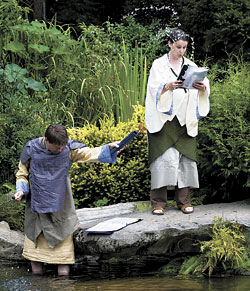Composer Byron AuYong curses—jocularly, but still—when the subject of the mainstream opera world comes up. “What about Beckett? What about Pinter?” he asks, exasperated that the theater establishment has embraced such boundary-pushing artists in a way that opera hasn’t caught up to; that there doesn’t seem to be room yet in the public’s imagination both for Aida and for what he does.
But he plans to drop his current work, Kidnapping Water: Bottled Operas, smack in the middle—literally, in the Seattle Center fountain—of our city’s biggest arts event. His work, in fact, was designed to be performed outdoors, and Bumbershoot will be the culmination of its monthlong run in various water-inclusive parks and public spaces, from puddles to Puget Sound, around greater Seattle. More precisely, it’s not a work but a set of 64 one-to-five-minute vignettes for singer and percussionist, a songbook of story/poems that can be excerpted and recombined. Eight poets provided AuYong with eight texts each, and the project’s four singers and four percussionists were each assigned 16 of the mini-operas according to an I Ching–based chart. From the complete set, two 45-minute programs, directed by Bret Fetzer, will be selected and performed this Saturday and Sunday afternoons.
Water is both the theme of the poetry and the percussionists’ basic sound source. They create musical effects both dramatic and delicate by manipulating it with eight natural materials (also assigned systematically): wood, stone, bamboo, bone, rope, animal hide, plants (for example, a gourd), and metal. As percussionist Ben Morrow describes it, “Byron left a lot open to the performers…I’ve been using gongs and triangles (dipping them in the water), hitting the surface of water itself with my hands or bamboo sticks, washing a rag (rhythmically), blowing through a bamboo straw into a bowl of water…”
Metaphors abound in AuYong’s work: the voice as liquid, poured forth; the I Ching, like water, a medium of fluidity and change; the collection of 64 operas as a pool or well from which to gather stories; a bottle of water, like a song, as a container of pleasure and sustenance—”You open a bottle and it sings to you,” AuYong says. Also I Ching–derived are the 64 texts, inspired by the traditional meanings of this divination device’s 64 possible trigrams, or random outcomes.
For example, opera #5, “El Vendador de Agua,” is Aaron Jafferis’ gloss on trigram #5, Hsu, “Waiting (Nourishment).” Morrow and soprano Josie Davis perform it on a recent Monday morning in the fountain outside City Hall. AuYong leads them through breathing exercises before Davis wades ankle-deep into the water. She’s clad in a beige and white kimono with a sage-green sash; Morrow, in gray and blue, kneels a few feet away, tapping the water inside and outside five metal bowls with bamboo rods. His bindered score lies directly before him, in the water, its pages protected by plastic sheets.
Davis’ silk ribbon of a voice, fragile yet poised, competes with the white noise of both the fountain itself and Fourth Street traffic; they don’t obliterate it, but force your ears to focus. It’s surprising how big a difference the simple act of standing in water makes: Davis, arrestingly, looks both isolated—poignantly island-like—and otherworldly, like some naiad or spirit who rose from the depths.
Naturally, a crowd gathers. (AuYong has found, performing in parks, that kids, even teenagers, are the most responsive and willing to approach the musicians.) But the three-minute scene is soon over, and Au-Yong and his crew pack up and move on to present another of the 64 evanescent fragments. Morrow says of the baggage-free, get-in-get-out aspect of AuYong’s work, “There was a semi-guerrilla aspect to the whole thing. We got kicked out of a couple fountains, including the one right in front of the Central Library.”
“Drumming and singing are the foundations of my music,” AuYong says. In this way Kidnapping Water, made of just those two elements, is a summary of his work, just as the inclusion of the I Ching reflects his roots: Of Chinese descent (his grandparents grew up in Fujian province, his parents in the Philippines), AuYong was born in Pittsburgh and raised in the area.
Eric Banks, director of new-music choir The Esoterics, is a fan, and AuYong has written several works for the group that incorporate theater, movement, and a deep concern for nature. “I love Byron’s work,” he says; “I find that his writing for the voice is direct and visceral, but this remains completely subservient to the dimensions of space and movement that he includes…What’s more, I find Byron’s music to be relevant and revelatory—employing his art to open our eyes to issues that we should be aware of.”
AuYong hopes to present the entire set at some point as an evening-length work. I hope he can; opera #64, based on Carola Luther’s “Summer Tea,” would make a fantastic finale—the uncommonly beautiful suspended-in-time reflections of a woman preparing for a journey, both a leave-taking and a beginning:
House is painted.
Attic aired.
Suitcase ready.
Words in order…
A bowl of water
for my sister.
A pile of salt
for my brother.
And for my daughter
all the seeds…
==========
Kidnapping Water: Bottled Operas Seattle Center Fountain. 3–3:45 p.m. Sat., Aug. 30, 2:30–3:15 p.m. Sun., Aug. 31.







